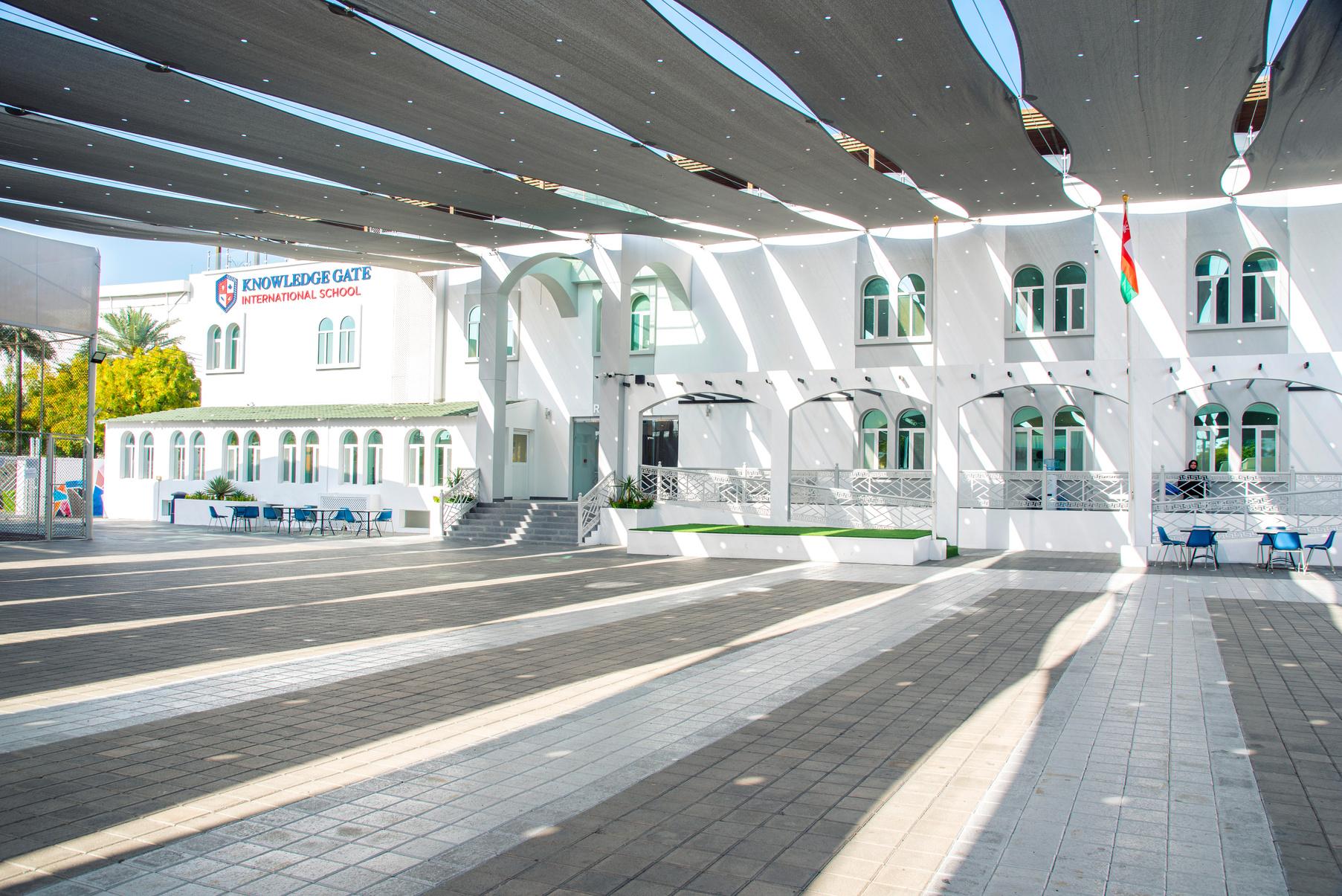

THE KNOWLEDGE
A Message from the Executive Principal

At KGIS we pride ourselves on being a caring, benevolent and supportive community, and this week has certainly reminded us how strong we are when we come together One of the most remarkable aspects of Ramadan is the unparalleled strength that communities exhibit during this Holy Month. Through shared rituals, acts of charity, and mutual support, Ramadan fosters a sense of unity and belonging among Muslims worldwide. This could certainly be felt at our KGIS Community Iftar this week as the KGIS Community came together to break their fast and raise money to support our charitable causes. This is always a highlight of the academic year!
Next week we will be welcoming 150 local workers into the school for Iftar over three evenings. The workers will enjoy food kindly donated by parents and will be served by our student volunteers demonstrating the strength of community in action and the ability of this special month to unite individuals from different walks of life in compassion, and mutual support. Events such as the Workers Iftars teach our children to give back, to be inclusive and empathetic. They learn that the shared needs of all humans transcend geographical, cultural, and linguistic barriers, and most of all these acts truly embody the essence of Ramadan!
Next week will also see Term 2 reports published to parents to keep you updated on the academic progress of your children. Continuing our drive to become a more sustainable school, we will be launching the ISAMS Parent App for all parents. The Parent App will also streamline all communication to parents Moving forward all academic reports, school newsletters, letters and notices will be published via the app Parents will also access all other apps for learning via the ISAMS Parent App, and will be able to see their child's daily attendance at school, timetable, teacher contacts, and behaviour record in the app also. Mr. James will be writing to all parents on Sunday to further introduce the ISAMS Parent App, and to provide instructions of how to download and access it.
Thank you as always for your generosity and support Ramadan Kareem!
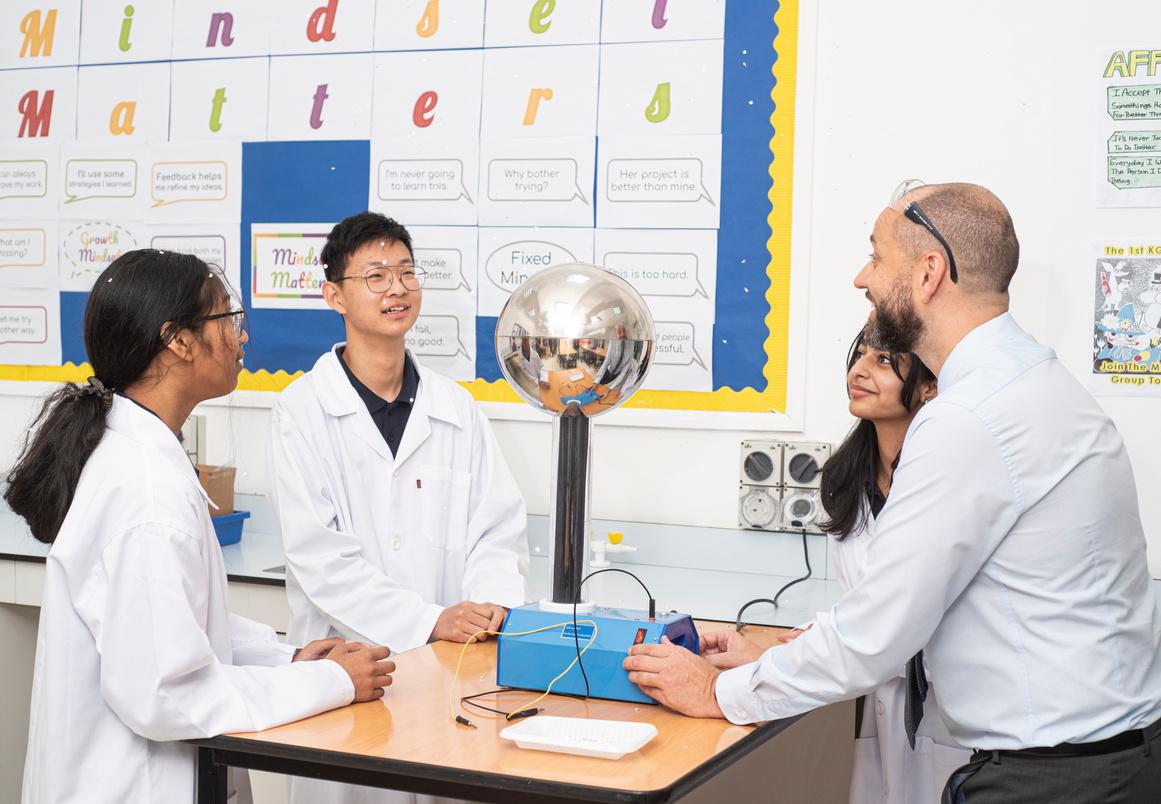
Key Dates
Please make a note of the following important dates:
Sunday 24 March-Tuesday 26 March: KGIS Workers Iftars
Thursday 28 March: Last day of Term 2
Sunday 31 March-Thursday 11 April: Spring Break (school closed)
Sunday 14 April: Start of Term 3
Please click here to access the Academic Calendar for this academic year
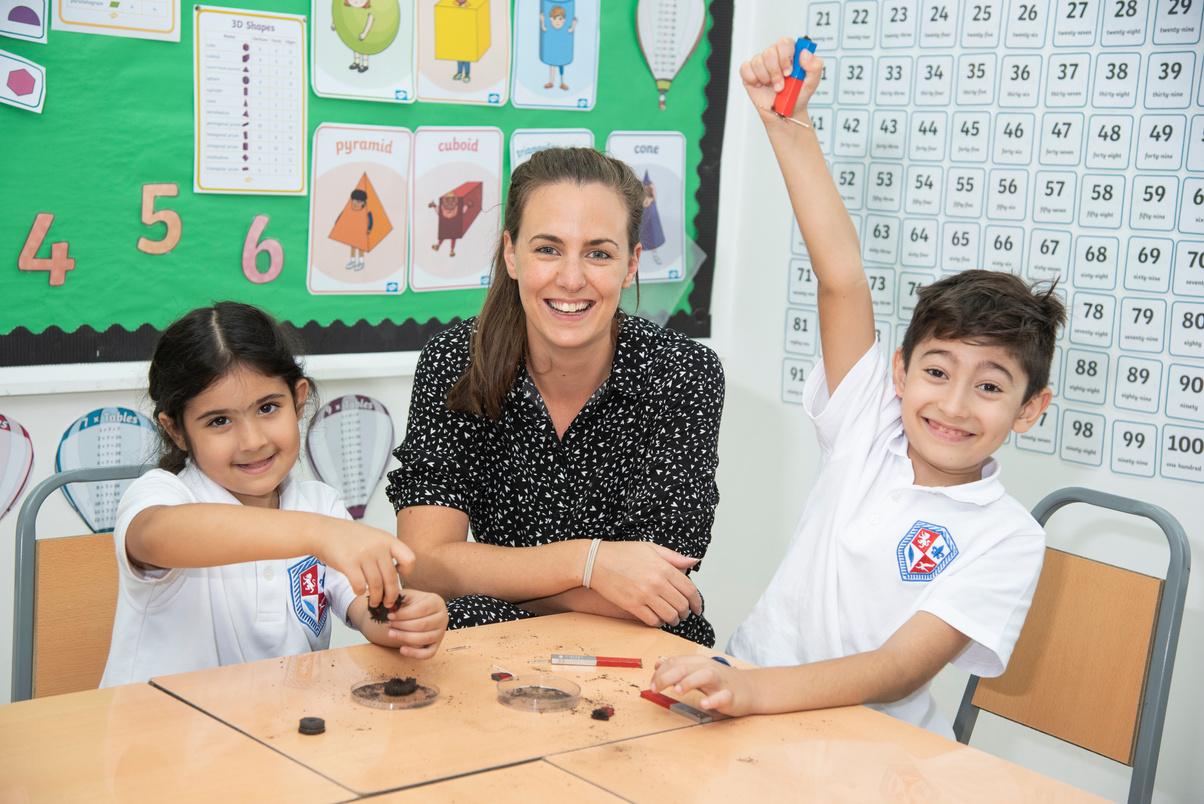
Learning Overviews
Clickonthelinksbelowtoaccessthelearningoverview,homelearningexpectationsand assessmentdatesforeachgrade:
KG1
KG2
Grade 1
Grade 2
Grade 3
Grade 4
Grade 5
Grade 6
Grade 7
Grade 8
Grade 9
Grade 10

The Holy Month of Ramadan at KGIS
Thank you to all the parents and students who have supported our KGIS 'Year of Giving' through taking part in and attending our Ramadan events A particular thank you to all the parents who ordered their Ramadan Boxes through the school. These will be distributed to needy families within the local community next week by Mr. Ibrahim and the Islamic Studies Department and we look forward to sharing the pictures with you all.
Thank you to all the families and friends who attended the wonderful KGIS Community Iftar yesterday. It was fantastic to see the entire community come together to pray and break their fast, and to enjoy the amazing buffet kindly sponsored by Azima Catering We were also pleased to be joined by some special guests from the Ministry of Education and thank them for their ongoing support of the school. We hope you enjoy the photos of the event below and look forward to welcoming you again next year!
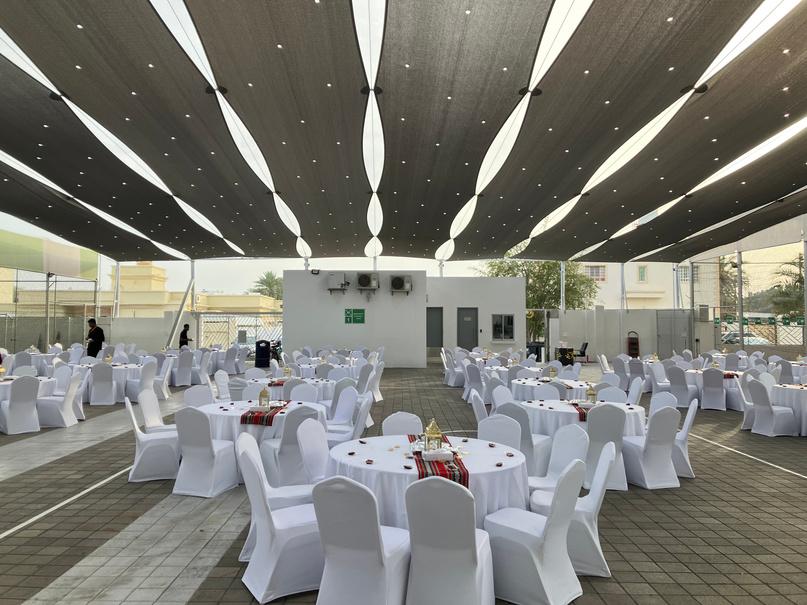
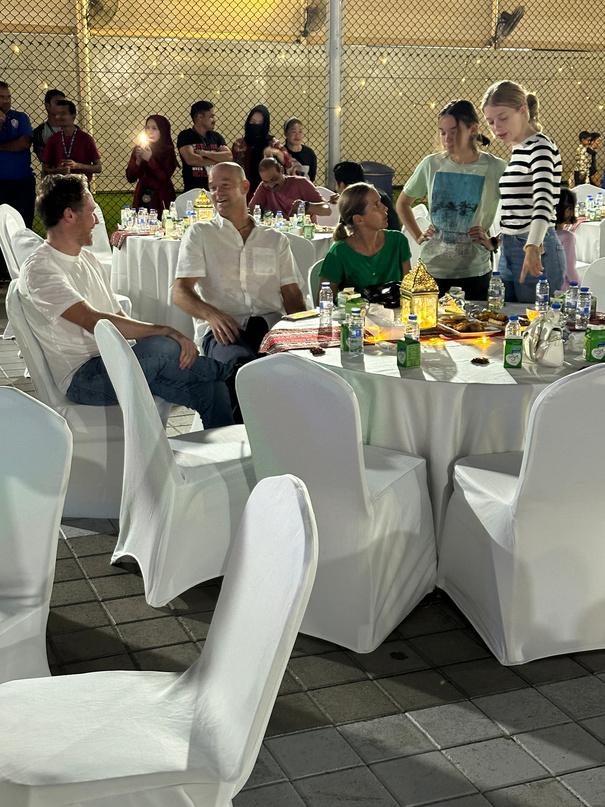
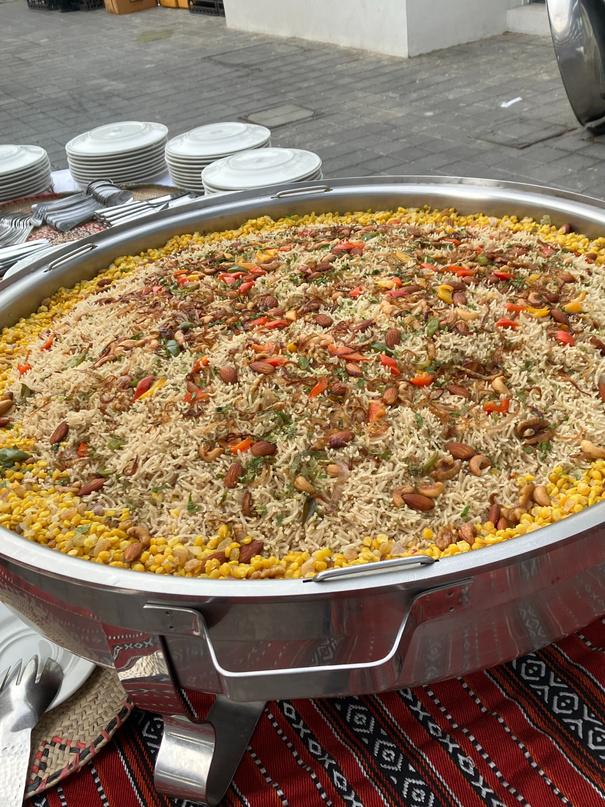
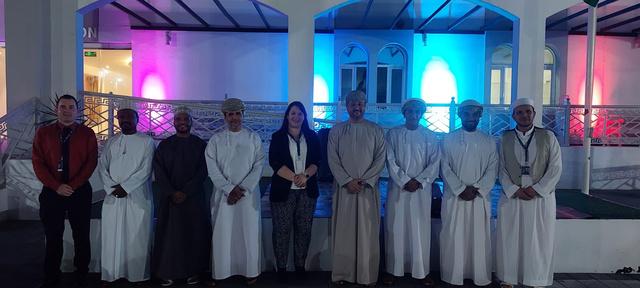
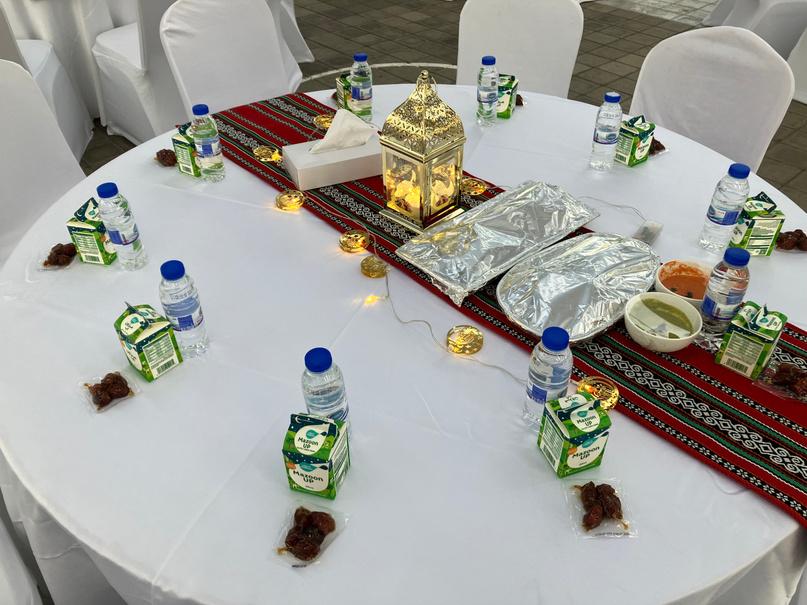
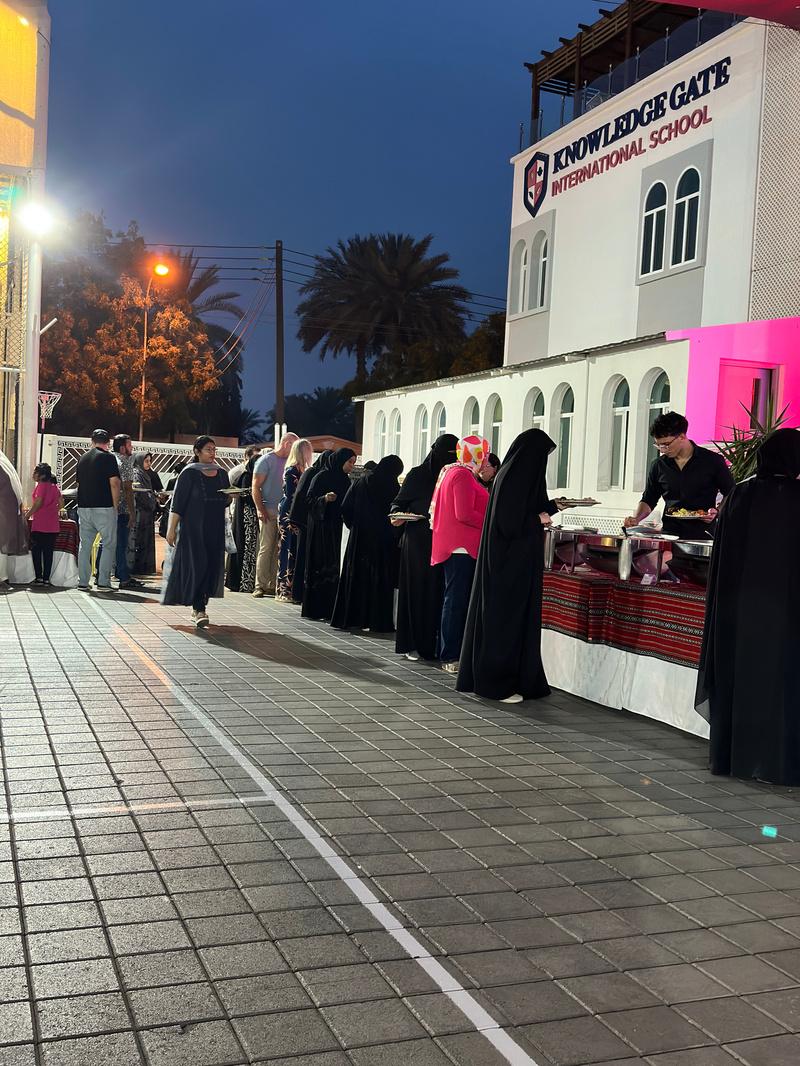
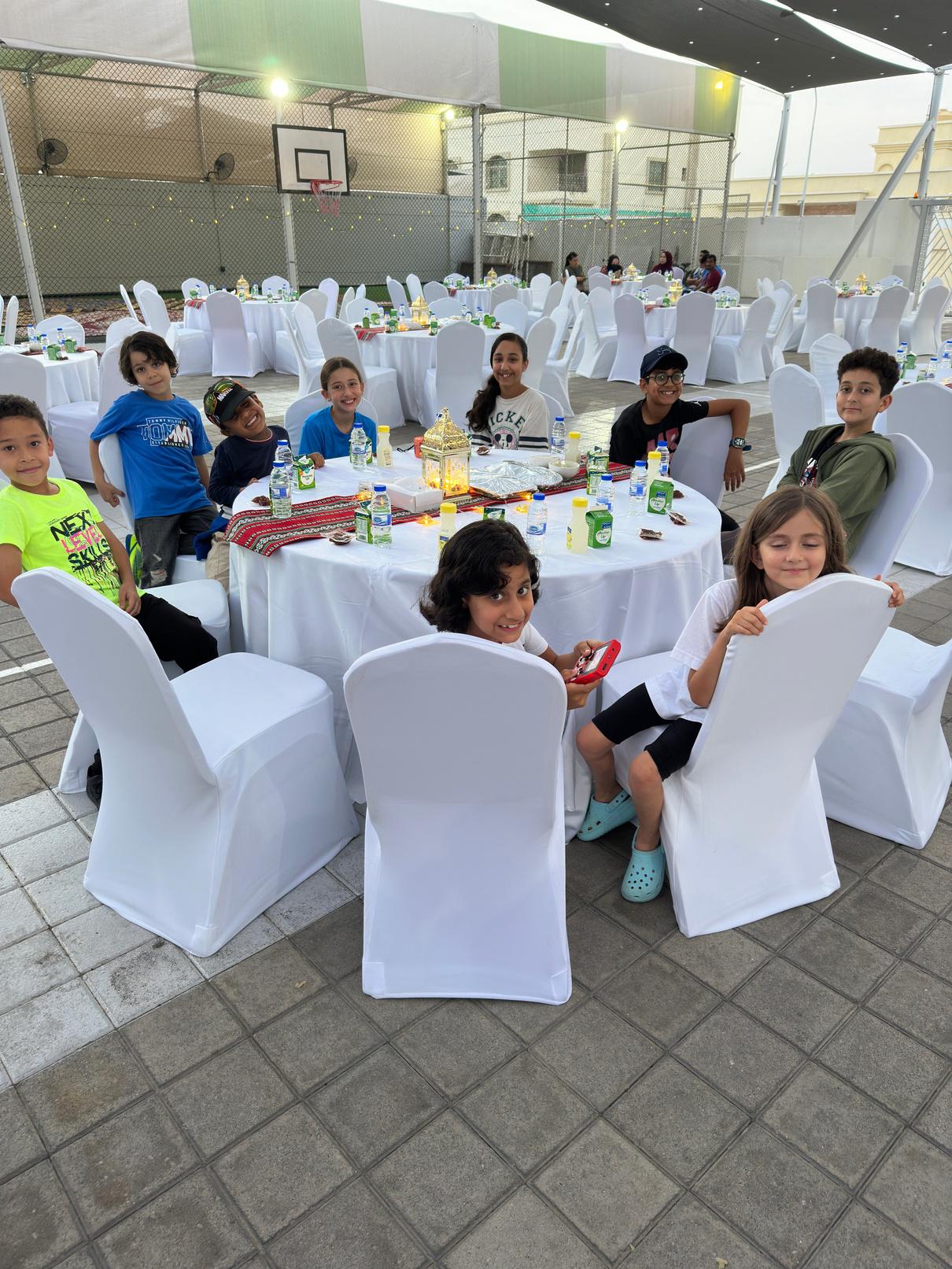
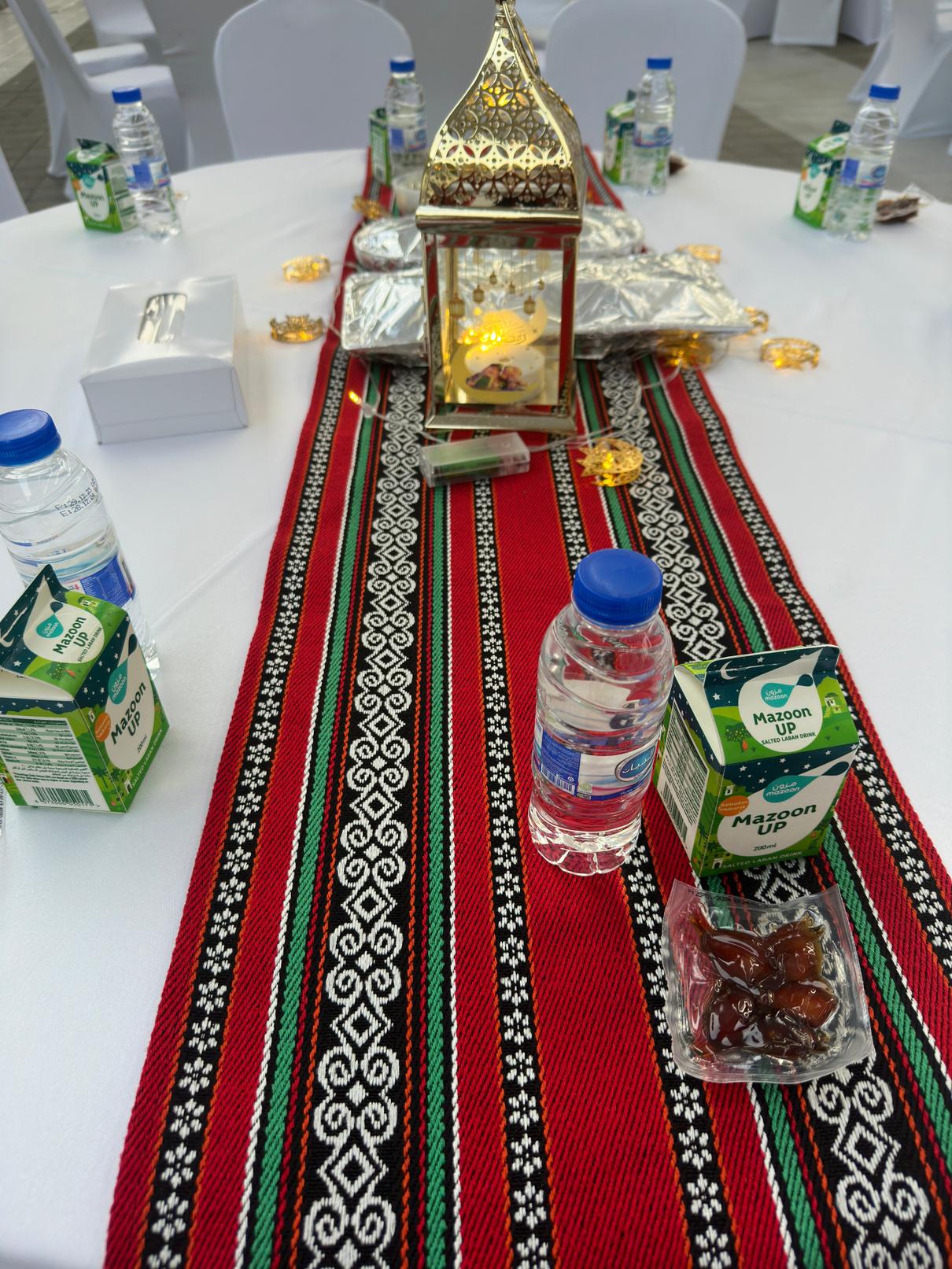
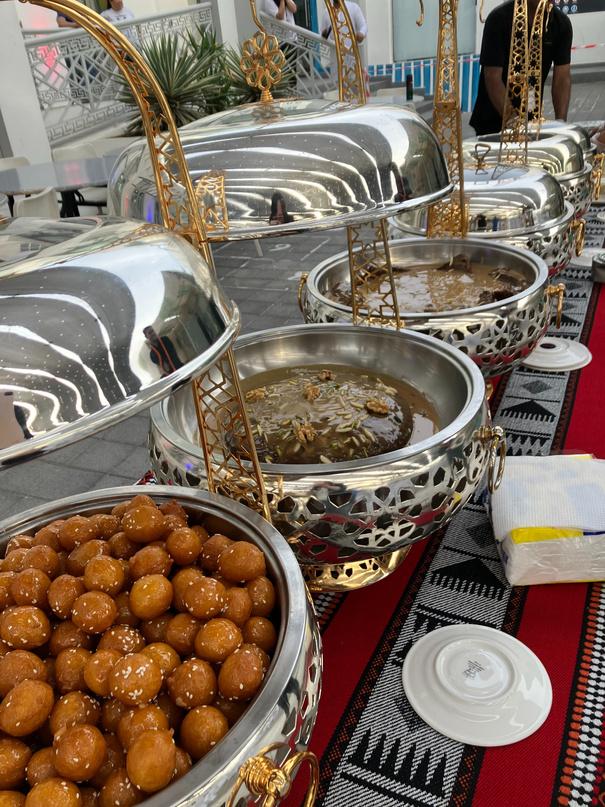

KGIS Workers Iftars
The Holy Month of Ramadan at KGIS
Following the great success of our Workers Iftars last year, the Student Council will once again be preparing and serving an Iftar meal to 50 workers based in the local community each evening during the week commencing Sunday 24th March. In order to support this fantastic student initiative, we are asking parents to consider if they would be willing to prepare and donate a dish for up to 50 people on one evening. This could be an appetiser (samosas etc.), a main dish or a dessert. If you would be willing to contribute a dish, and would be happy for the Student Council to contact you, please click here and complete the form
School Hours During the Holy Month of Ramadan
The Holy Month of Ramadan started on Tuesday 12th March. The timings of the school day are as follows:
KG: 8:15am-11:50am
Grades 1 & 2: 8:15am-1:15pm
Grades 3-12: 8:15am-1:45pm
Parents are asked to drop their children at school no earlier than 7:50am, and no later than 8:15am. The school bus service will operate with amended timings as per the above. Please note that the morning pick up will be approximately one hour later than normal during the Holy Month of Ramadan.
Please also note that there will be no before or after school extra-curricular activities during the Holy Month of Ramadan. During the Holy Month of Ramadan, the school will operate designated fasting and non-fasting areas at break and lunchtimes. Students will be able to pray during the school day and take part in daily group prayers under the supervision of the Islamic Studies Department.
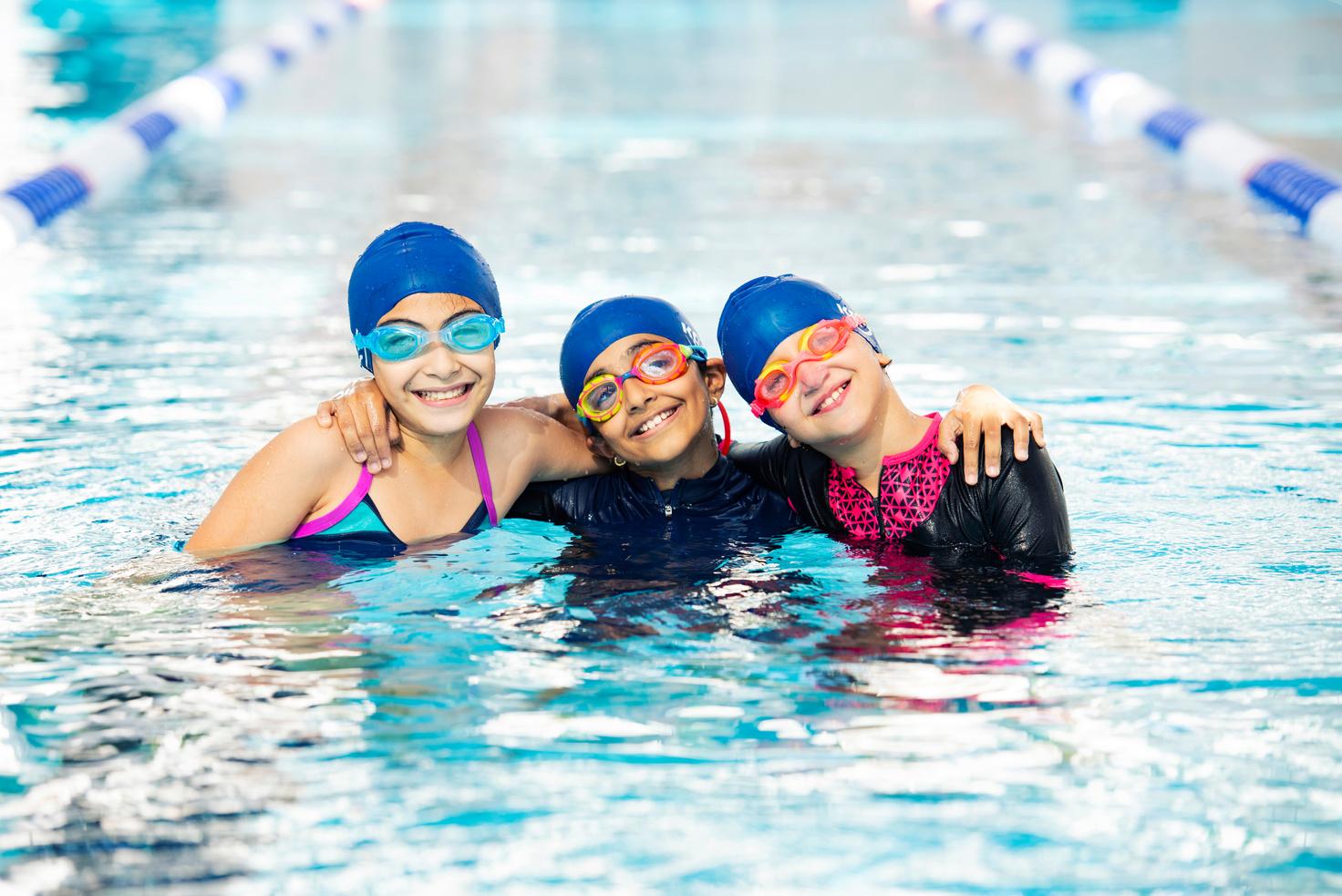
Extra-Curricular Activities
A reminder that our programme of extra-curricular activities has now started for all students. We have a huge variety of activities on offer before school, at lunch times and after school. There really is something for everyone! All activities are free of charge and students are encouraged to join as many as possible in order to broaden their skills. Please click on the link above to see the timetable of activities.
Extra-Curricular Activities during Ramadan
A reminder that Extra-Curricular Activities are not taking place during the Holy Month of Ramadan. All activities will resume as normal when we return to school after the Spring Break.

Inspired Forte Music Programme
Extra-Curricular Activities
We are very excited to remind parents of this unique opportunity available for students who learn a musical instrument! This opportunity is only available to students in Inspired schools, and offers a series of private instrument lessons with a tutor from the Royal College of Music in London - the world’s number one music conservatory.
In partnership with The Royal College of Music in London, Forte has launched the Pathways to Performance programme exclusively for Inspired students. The programme offers a package of private lessons with otherwise inaccessible top music tutors, verified by The Royal College of Music, the world’s #1 ranked music conservatory. Every private tutor currently teaches at or has received music education training at The Royal College of Music, so they are not just excellent Royal College of Music musicians, but they have also been trained by the best in music teaching practice.
The programme caters to students at senior school level who desire to achieve advanced levels in their instrumental abilities and to those preparing for auditions or public performances. Upon completion, students will have the chance to get certificates of attendance issued from The Royal College of Music, further reflecting their hard work.
Further information can be found: https://fortelessons.com/inspired . The following video also offers more insight into the programme: Click here for video
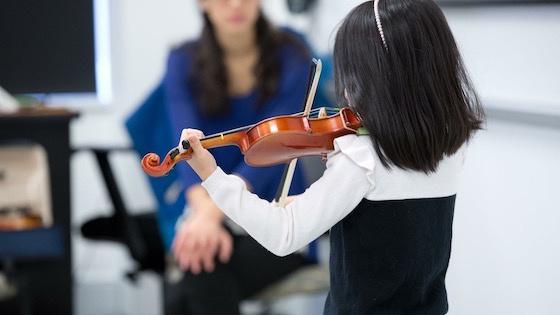

Inspired Summer Camps
Inspired Global Camps, a tailored option for every child
Watch our YouTube video here!
Extra-Curricular Activities
Our summer camps give students the chance to stay at some of Europe's top boarding schools and take part in programmes delivered by world-class partners. It is an opportunity to travel, meet peers from other countries and get involved with inspiring activities, learning new skills that will stay with them forever. For more information, please click here.
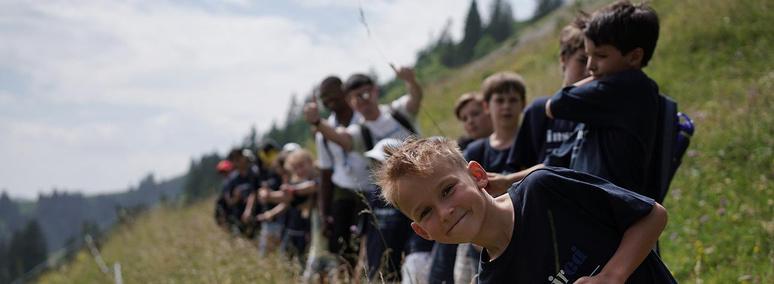
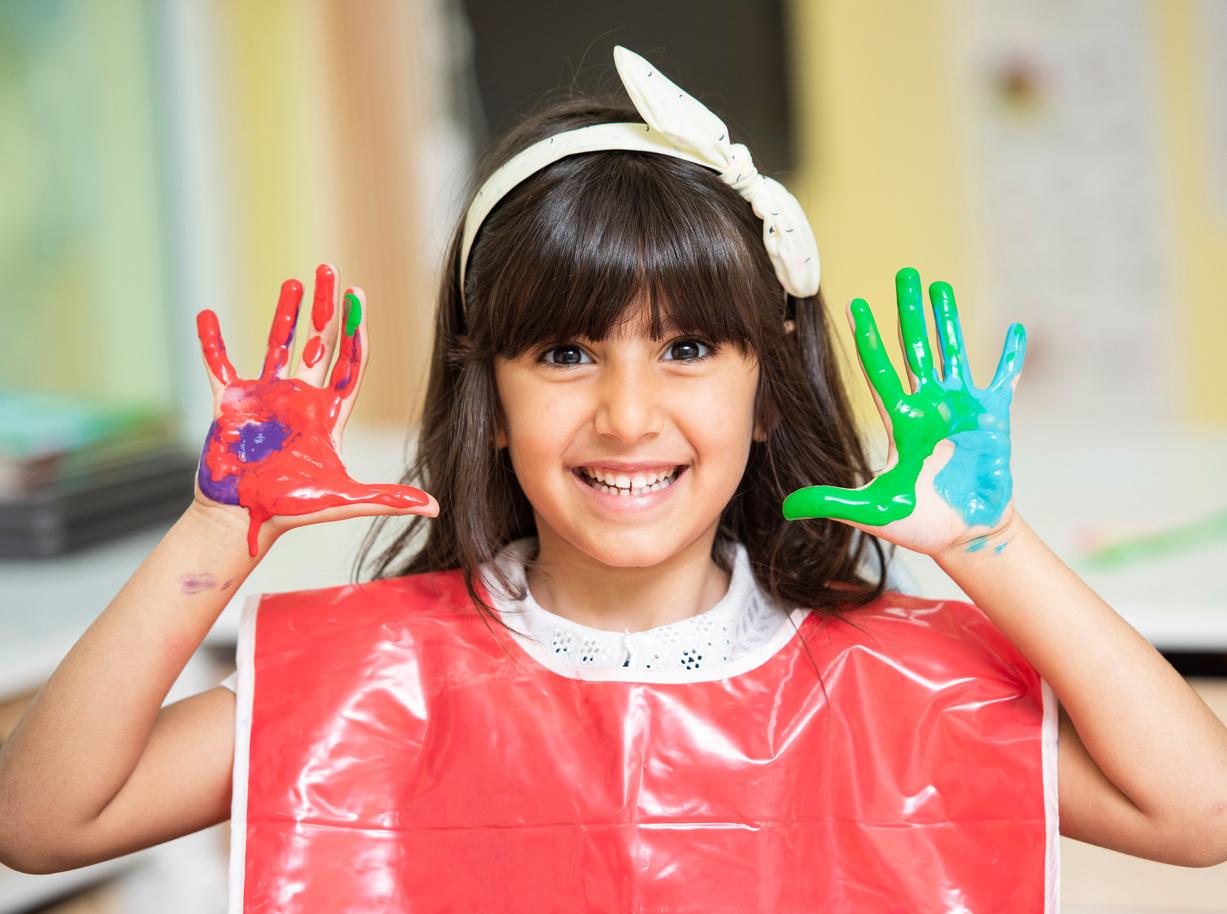
KG Update
News
Each day in KG, the children are immersed in a wide variety of carefully planned multisensory activities. This week has been no exception and the children have thoroughly enjoyed exploring, sand, water, coloured sand, play dough, paint and rice! Sensory play activities are paramount in the early years of a child's development as they engage multiple senses, fostering crucial cognitive and physical growth. By encouraging exploration through touch, sight, smell, taste, and sound, children build neural connections that lay the foundation for learning. Sensory play not only stimulates curiosity but also enhances fine motor skills, language development, and problem-solving abilities. Moreover, it nurtures creativity and emotional regulation, providing a safe space for self-expression and sensory processing. Through multisensory provision, children embark on a journey of discovery, igniting a lifelong love for learning and exploration.
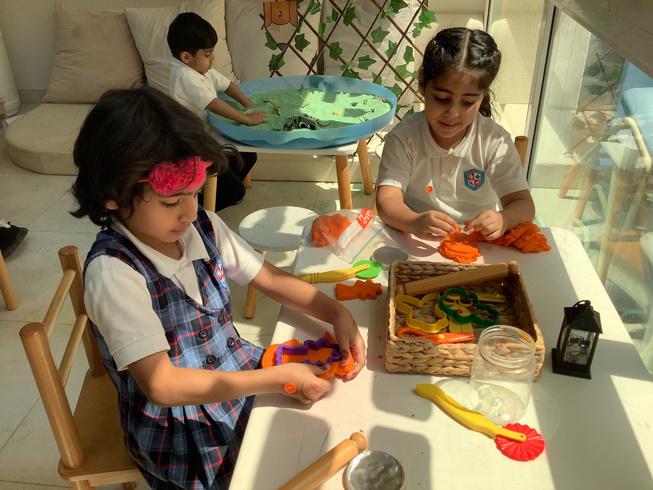
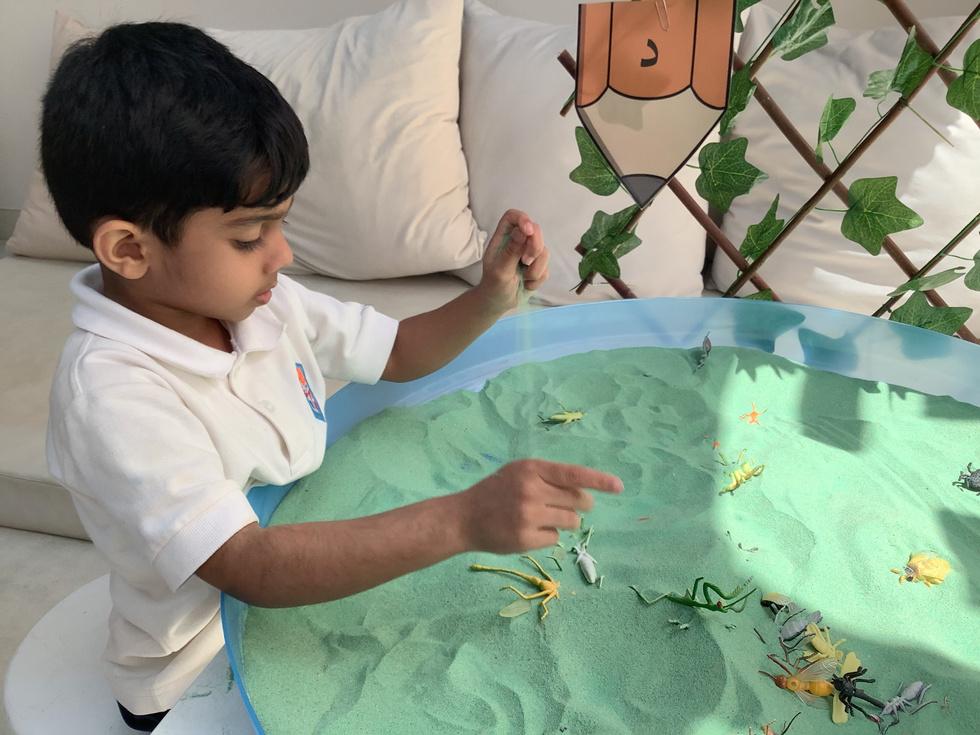
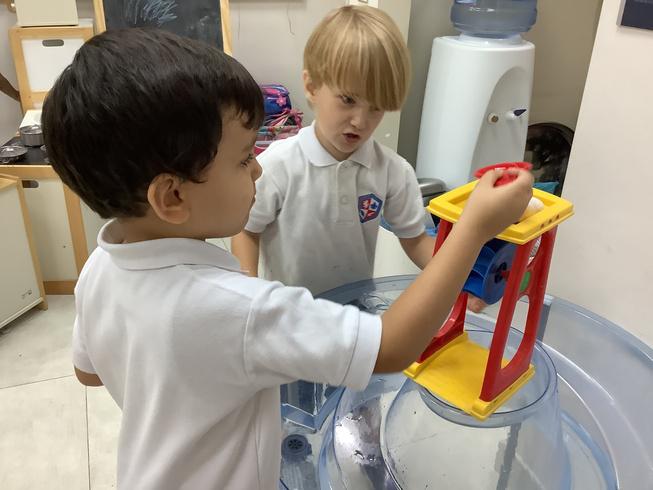
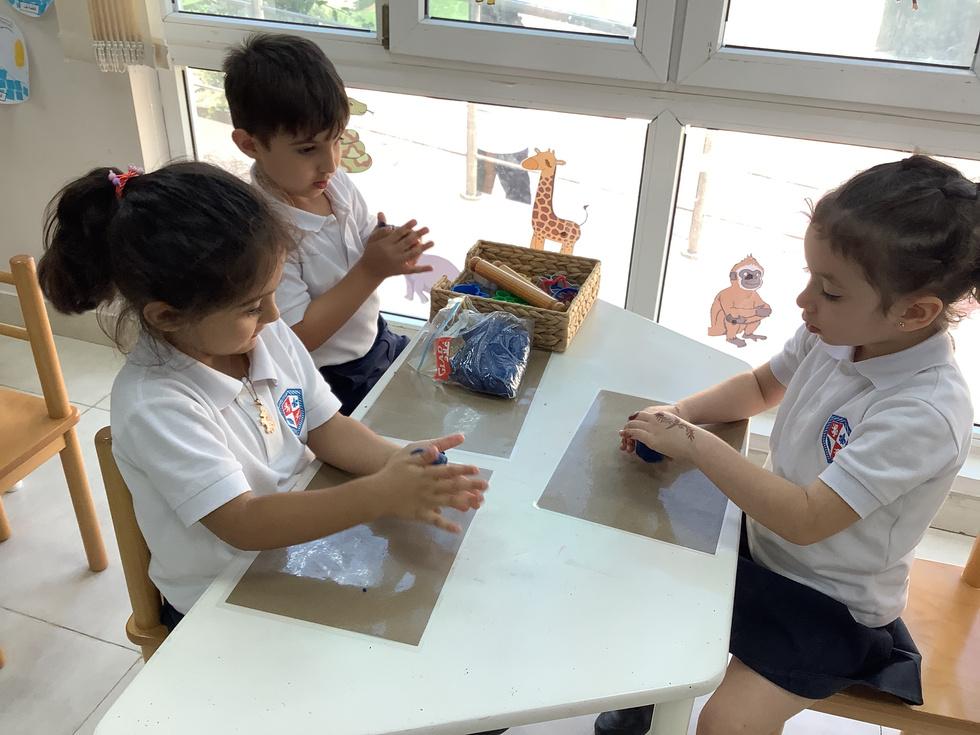
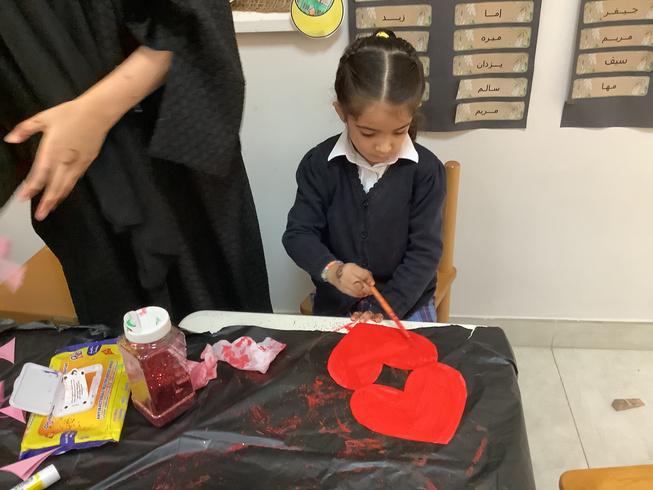
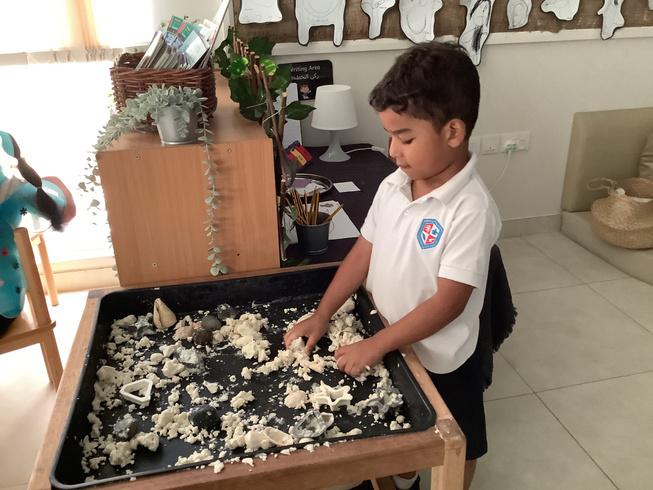
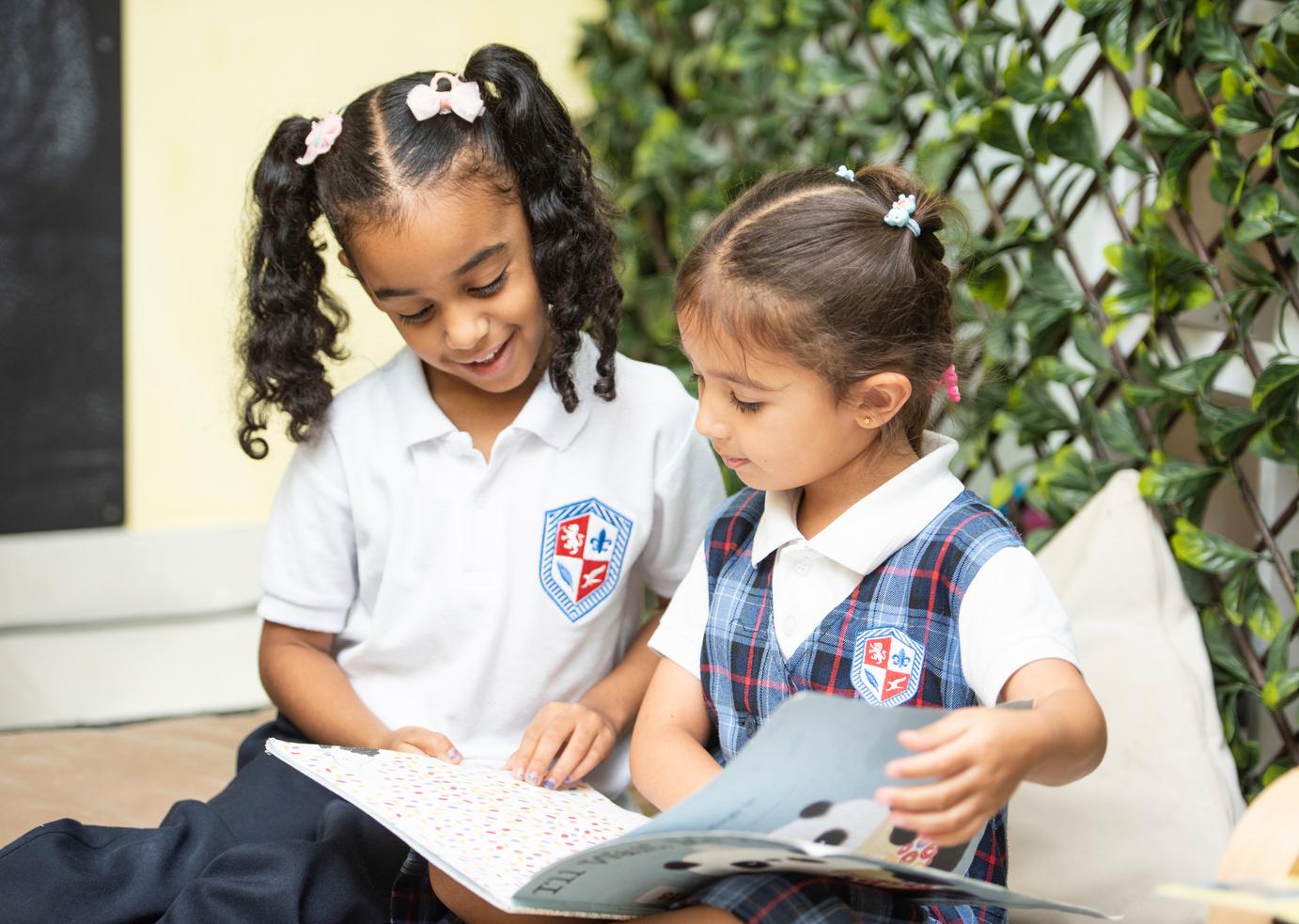
A Message from Mr. Ian, Head of Primary
Primary News
Recently we celebrated Pi Day at KGIS. Children enjoyed Maths activities as can be seen in some of the photos in this week’s newsletter
I often meet parents and am asked how they can better support their child’s educational development at home As we recently celebrated Pi Day, here are some ideas and suggestions on how better to support your child in numeracy:
Create a Maths-Friendly Environment at Home:
Ensure that your home environment is conducive to learning Maths. Have plenty of Maths resources readily available, such as Maths workbooks, puzzles, games, and educational apps like Times Table Rockstars and Numbots Keep these materials organised and easily accessible for your child to use whenever they feel like practising or exploring mathematical concepts.
Incorporate Maths into Everyday Activities:
Look for opportunities to integrate Maths into your daily routines and activities. For example, involve your child in cooking or baking activities where they can practise measuring ingredients and understanding fractions. Use shopping trips to reinforce concepts like addition, subtraction, and budgeting. Encourage your child to count objects they encounter in their environment or identify geometric shapes in everyday objects.
Provide Hands-On Learning Experiences:
Engage your child in hands-on Maths activities that allow them to manipulate objects and explore mathematical concepts in a tangible way Use items like building blocks, measuring tools, or household objects to demonstrate mathematical principles. Encourage your child to solve real-world Maths problems using concrete materials, which can help solidify their understanding of abstract concepts. Use of items in the home such as the child’s toys, dried pasta or even sweets can be a great way to motivate and support your child.
Encourage Problem-Solving and Critical Thinking:
Foster your child's problem-solving skills and critical thinking abilities by presenting them with Maths challenges and puzzles Encourage them to approach problems creatively and explore different strategies for finding solutions. Ask open-ended questions that prompt your child to think deeply about mathematical concepts and explain their reasoning Make trips to the mall or journeys in the car Maths focused by using money or working out distances between locations.
Provide Positive Reinforcement and Support:
Offer your child encouragement and praise as they engage with Maths activities and make progress. Focus on effort and perseverance rather than just the correctness of answers. Be patient and supportive when your child encounters difficulties, and provide assistance when needed without simply giving them the answers. Celebrate their achievements and milestones in Maths to boost their confidence and motivation
Ms. Denise is our Primary Maths Co-Ordinator and is always more than happy to offer suggestions or support to parents who feel they need more help at home. Her email is denise.h@kgis-edu.com should you wish to contact her.

Grades 1 & 2
Primary News
The children have enjoyed making Mother's Day cards in Art. They cut out hearts and decorated them. We arranged them into a 'bunch of flowers' and added stems and a bow In English, the children wrote a message for their Mum to show how much they appreciate them. We hope you love your card! Have a lovely Mother's Day and thank you for all that you do.
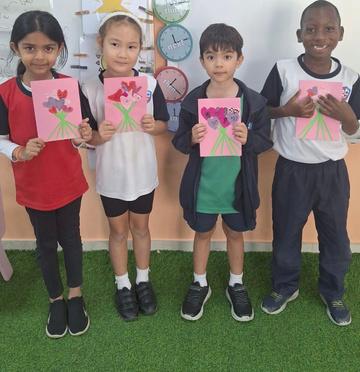
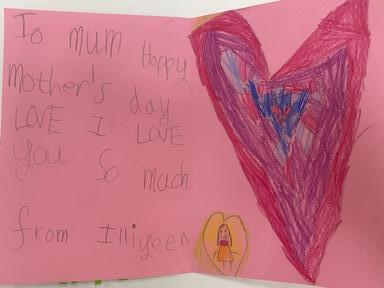
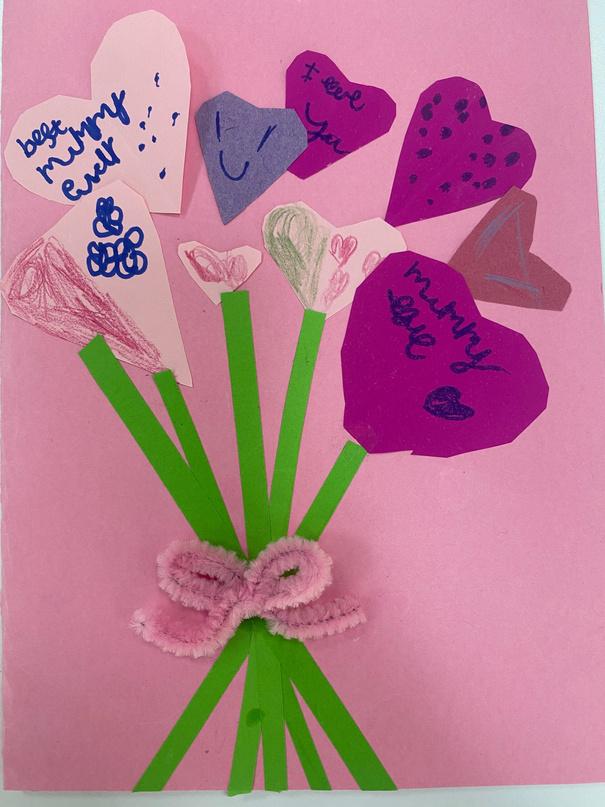
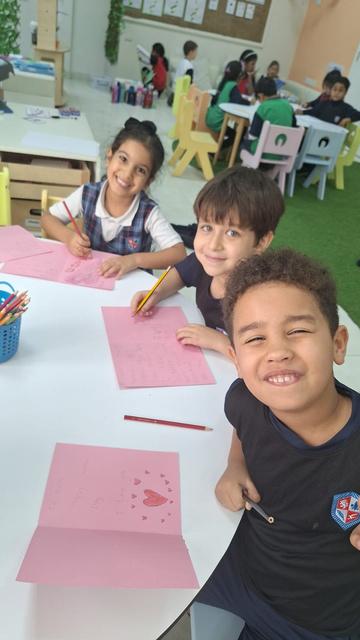
Grades 3 to 5
Grade 3 children enjoyed activities recognising PI Day as part of their Maths lessons this week. They focused on practical Maths activities using manipulatives to apply prior learning into real life situations. One of the topics they have been looking at recently is measuring and using measures in real life Children learned how to measure length using standard and non-standard units, understand weights and how to use this knowledge in real life such as using weighing scales.
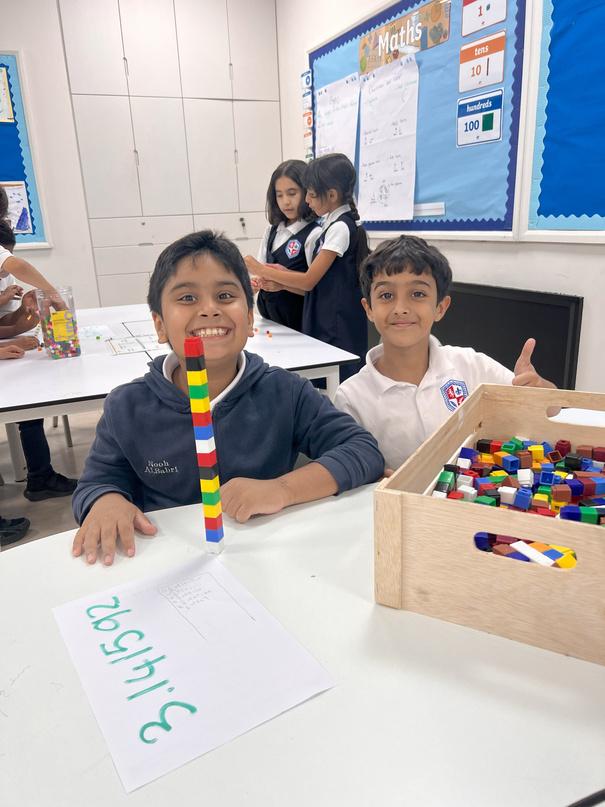

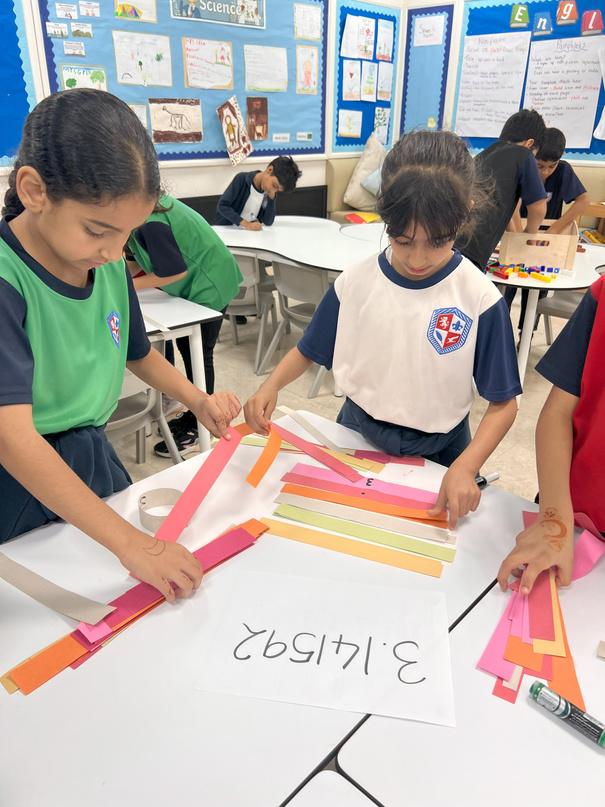
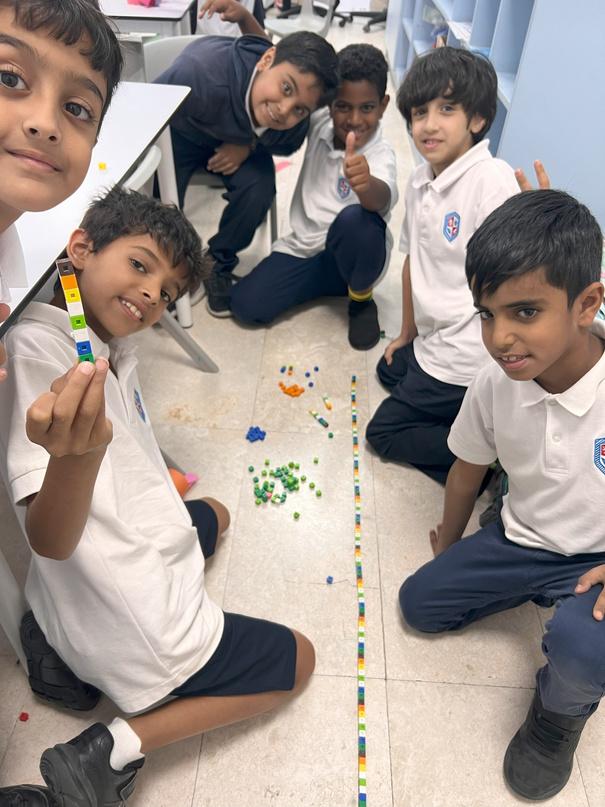
Primary News
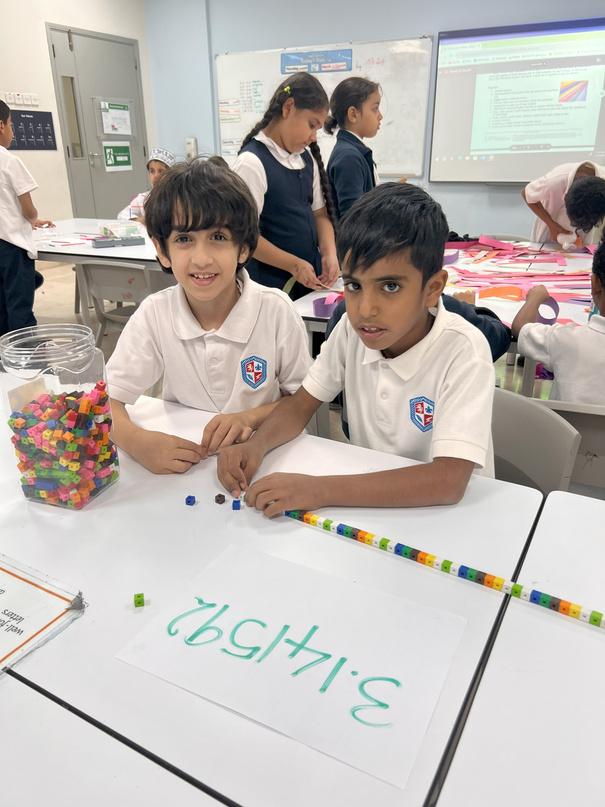
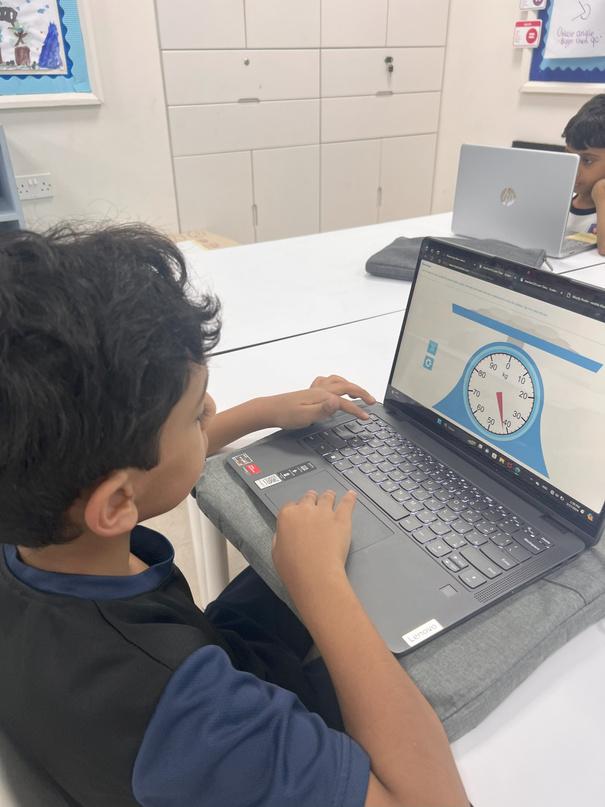
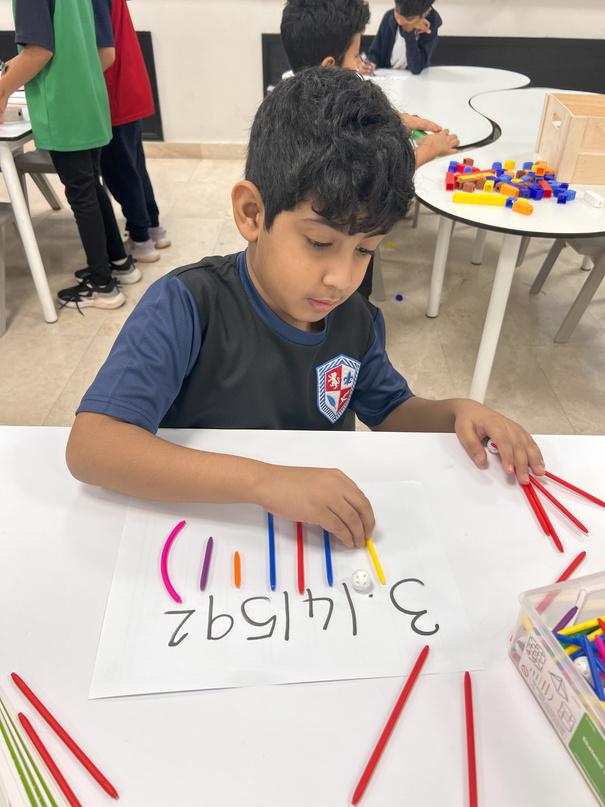
Grade 4 students were learning about word patterns in Arabic lessons this week. They spent time learning about relative nouns and how to correctly apply them. They worked in groups to create a mind map of relative nouns and how to use each noun in sentences of their own creation.
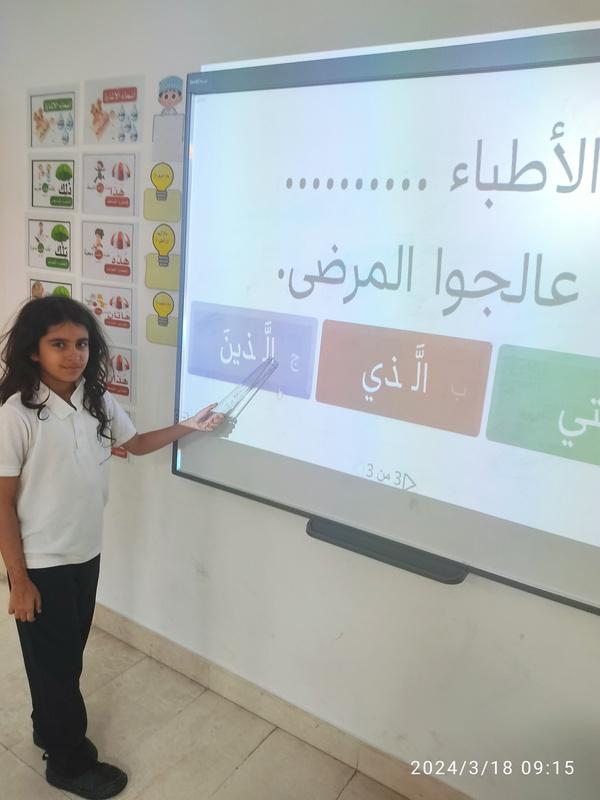
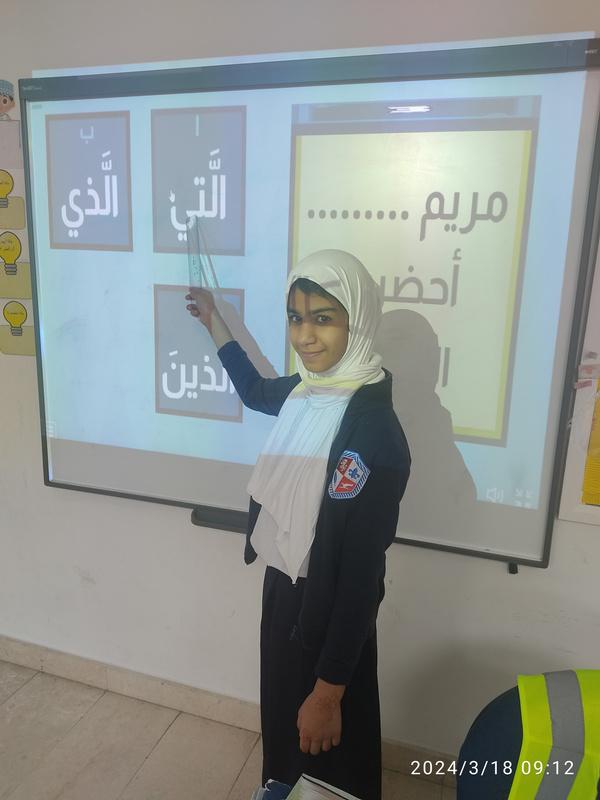
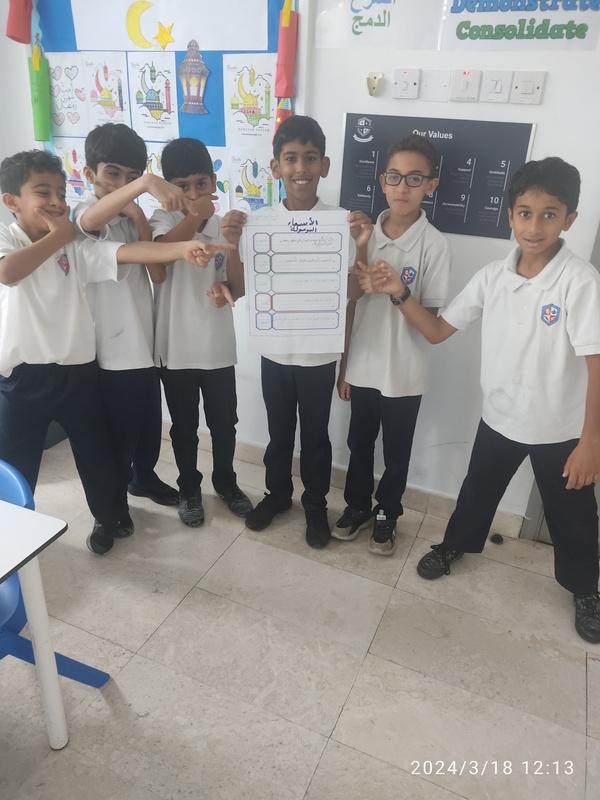

Primary News
Grade 5 have been reading non fiction texts and are currently engrossed in "Mama Miti" which actually means "the mother of trees"! This powerful story explores the significant role of trees in our ecosystem and the inspiring story of Wangari Maathai, a Kenyan environmentalist
Throughout this unit, our learners have been mastering the skill of analysing balanced arguments. They learned to locate relevant information, identify different points of view, and provide thoughtful commentary on the topic at hand.
As part of their writing exercises, learners will be honing their skills in producing extended pieces of writing about the environment. They'll get to practise using a range of connectives and a variety of punctuation to create a cohesive and impactful piece of work.
In addition, our students will have plenty of opportunities to engage in class debates and explore the power of Drama. They will learn to adapt the pace and tone of their speech as they express their thoughts on environmental issues Through these engaging discussions, learners will not only develop their ability to articulate their thoughts effectively but also reflect on different perspectives and respond thoughtfully.
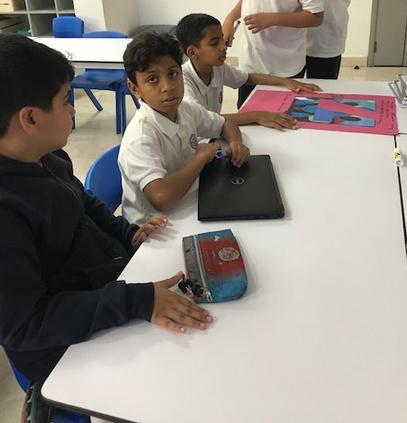
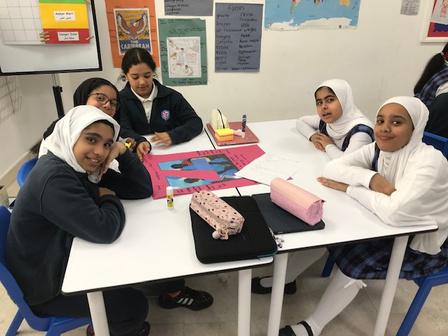
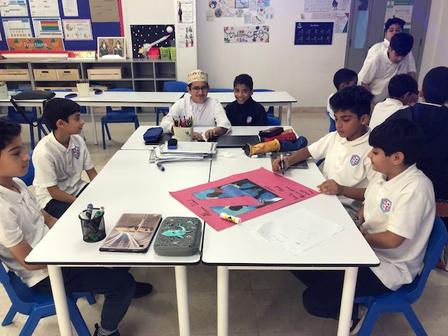
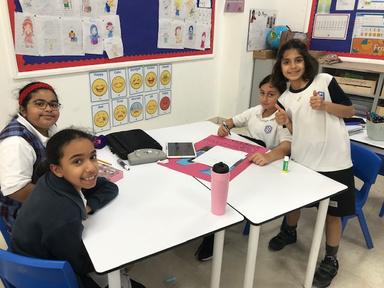
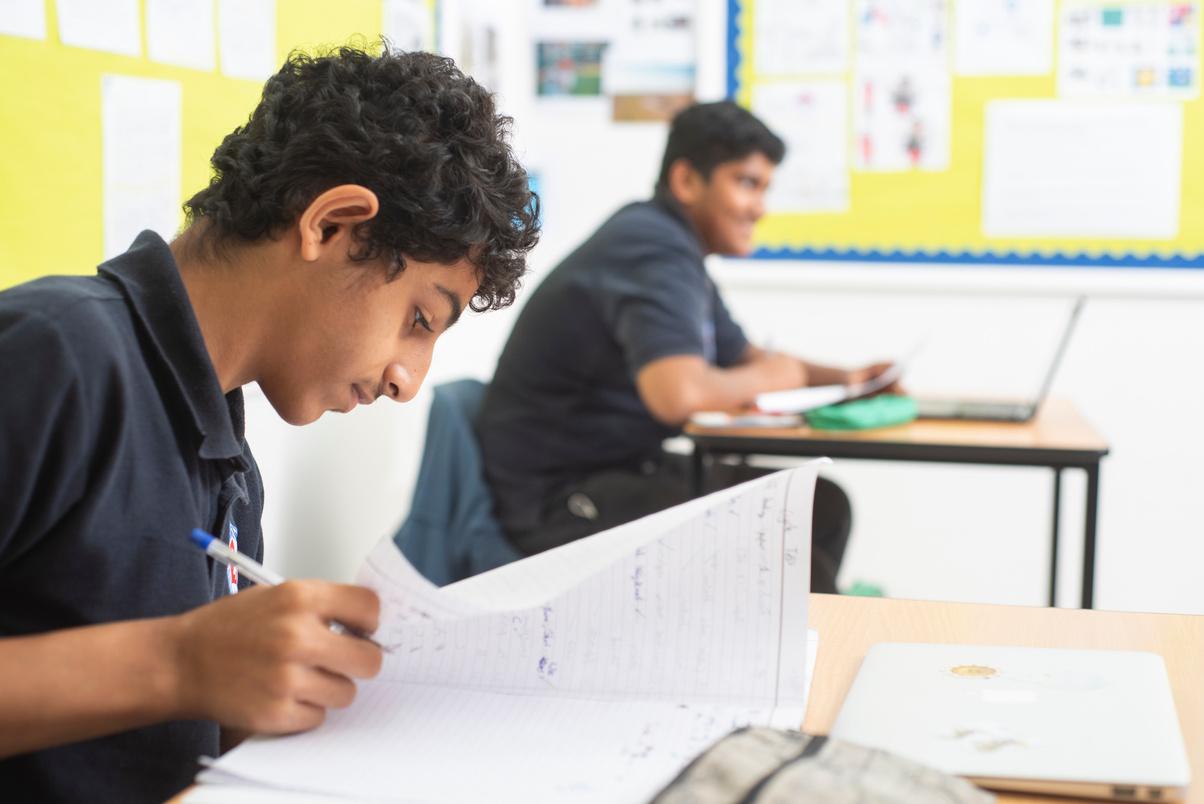
Message from Mr. James, Head of Secondary
Secondary News
Welcome to another update from the Secondary Phase at KGIS It is hard to believe that we have just one week left of Term 2! Nonetheless, it has been another busy week. Our Grade 8 students had the opportunity to experience new subjects as they begin to decide on their IGCSE Options. This pivotal stage marks a significant milestone in their educational journey, as they navigate through various disciplines, discovering their passions and strengths. Through hands-on experiences and engaging activities, they gained invaluable insights into potential areas of interest, empowering them to make informed decisions about their academic pathways. Guided by our dedicated educators, our Grade 8 students embraced this opportunity with enthusiasm and determination, demonstrating their readiness to embark on the next phase of their educational journey with confidence and clarity A reminder that students need to have selected their options with the following Google Form by Thursday 28th March.
As our Grade 10 students approach their final preparations for their IGCSE exams, the time has come to select their pathway and subject options for Grade 11. This is a reminder of the email that has been sent to parents regarding the different Bilingual and A- Level pathways available It is imperative that students choose the correct pathway and subjects. Students have already had lots of discussions with their teachers who have given their professional advice. The decision-making process for selecting pathways and subjects is a crucial step in shaping their academic journey and future career prospects. Therefore, we encourage both students and parents to carefully consider all available options, taking into account individual interests, strengths, and aspirations. We are committed to providing guidance and support throughout this process to ensure that each student makes well-informed choices aligned with their academic goals and personal ambitions. A reminder that students need to have chosen their options by Thursday 28th March. Students can fill both the Bilingual and A-Level Google Forms at this time and finalise which pathway they will follow once they receive their IGCSE results.
Finally, the highlight of the week was our Community Iftar It was fantastic to see so many of our students and parents come together and break their fast as a community. The event not only provided an opportunity for reflection and gratitude but also fostered a sense of inclusivity and understanding within our school community Through shared meals and meaningful conversations, bonds were strengthened, and a sense of belonging was reinforced, reaffirming the importance of coming together in celebration of our diverse identities and shared humanity. The Community Iftar served as a powerful reminder of the KGIS Universal Islamic values of benevolence, gratitude, and support, inspiring us all to continue building a more inclusive and harmonious community where everyone feels welcome and valued

Revision Tip - Mobile Phone Use
Secondary News
As technology has become increasingly integrated into our daily lives, it's important to acknowledge the potential dangers associated with its use. In particular, the overuse of mobile phones has become a major concern, especially for teenagers. While mobile phones can provide many benefits such as quick communication and access to information, excessive use of mobile phones can have negative consequences. It's important to monitor your teenager's mobile phone usage and set boundaries to ensure they are using their device responsibly Here are a few suggestions to help you regulate mobile phone usage in your home:
Set specific times for phone usage: Encourage your teenager to set aside specific times during the day for phone usage, such as during designated break times.
Limit screen time: Encourage your teenager to limit their mobile phone usage and to take regular breaks from the screen to prevent eye strain and other associated health issues.
Encourage other activities: Encourage your teenager to participate in other activities such as sports, reading or spending time with friends and family.
Model responsible behaviour: As parents, it's important to model responsible behaviour and limit your own mobile phone usage in front of your teenager
Overall, it's important to be aware of the potential dangers associated with the overuse of mobile phones and to take steps to ensure that your teenager is using their device responsibly. By working together to set boundaries and monitor usage, we can help our children become responsible digital citizens.
Studies have shown that excessive use of mobile phones can lead to decreased academic performance, poor sleeping habits, and social isolation Problems that may arise include:
Distractions: Mobile phones can be a major source of distraction for students. With constant notifications and access to social media, games, and other apps, students may be easily distracted from their studies, leading to decreased concentration and productivity.
Poor sleep quality: Mobile phone use can disrupt students' sleep patterns, as the blue light emitted by the screen can interfere with the body's natural sleep cycle, making it harder to fall asleep and stay asleep. Poor sleep quality can lead to daytime drowsiness, decreased focus, and reduced academic performance.
Reduced academic performance: Students who spend excessive amounts of time on their mobile phones may have reduced academic performance. Studies have shown that excessive mobile phone use can lead to decreased reading comprehension, lower grades, and decreased motivation to learn
Physical health issues: Excessive mobile phone use can also have physical health impacts such as neck and back pain, headaches, eye strain, and poor posture.
Social isolation: Mobile phone use can lead to social isolation, as students may spend less time interacting with peers in person and more time communicating through their devices. This can lead to decreased social skills, reduced opportunities for collaboration, and increased feelings of loneliness
Overall, it's important for students to be mindful of their mobile phone use and to establish healthy habits that prioritize their academic and personal well-being. A proven method is for students to leave their devices outside their bedroom so as not to disturb or impact their sleep. Encouraging students to set boundaries, limit screen time, and take regular breaks from their devices can help them stay focused, engaged, and productive in their studies.

Subject Spotlight: Humanities & Social Sciences
Secondary News
Grade 7 Geography students have been actively engaged in collaborative group work, utilising visual aids to identify their assigned river features from the provided pictures. Through this hands-on activity, they not only familiarised themselves with various erosional and depositional river features but also honed their research and presentation skills. Using Google Slides as a platform, they delved into the intricate details of the formation processes, fostering a deeper understanding of the geological phenomena shaping our natural landscapes
Grade 6 Geography students have been enthusiastically delving into the world of cartography, honing their skills in correctly identifying Ordnance Survey (OS) Map symbols on a six-figure grid reference map. Through interactive exercises and guided practice, they are mastering the art of decoding symbols representing various geographical features such as rivers, roads, and landmarks.
Grade 10 Psychology students have taken a proactive approach to learning about the topic of sleep by creating comprehensive presentations on key studies, namely Siffre's cave study and Freud's dream analysis theory. Through collaborative efforts, they meticulously compiled information, delving into the methodologies, findings, and significance of each study. In a dynamic classroom setting, they embraced the role of both teachers and learners, conducting team-teaching sessions to disseminate knowledge and engage their peers. Utilising a variety of interactive strategies such as quizzes, exam-style questions, and gap fills, they not only reinforced their understanding but also actively involved their classmates in the learning process. This multifaceted approach not only enhances comprehension but also fosters a supportive learning environment where students actively participate and contribute to each other's academic growth.
Grade 9 Psychology students are currently immersed in the fascinating study of Willingham's theory and its profound implications on learning and development. To deepen their understanding, students were tasked with selecting specific areas of Willingham's work, including cognitive development, physical development, and social development, and becoming experts in their chosen domain. Through intensive research and critical analysis, they delved into the intricate nuances of their selected topic, unravelling its complexities and implications for educational practice Subsequently, students engaged in peer-led teaching sessions within their groups, sharing their newfound expertise and insights to enhance collective comprehension.
Grade 7 History students are actively engaged in group investigations, delving into the profound impact of the Black Death on both Asia and Europe. This historical pandemic, also known as the Bubonic Plague, reshaped the social, economic, and cultural landscapes of these continents in the 14th century. In their collaborative efforts, students are meticulously exploring various facets of the Black Death, including its origins, transmission, and devastating consequences on populations across Asia and Europe They are examining primary sources, such as historical documents and accounts, to gain insights into the spread of the disease and its far-reaching ramifications on societies of the time. Furthermore, students are analysing the differing responses and coping mechanisms employed by communities in Asia and Europe to combat the epidemic and mitigate its effects.

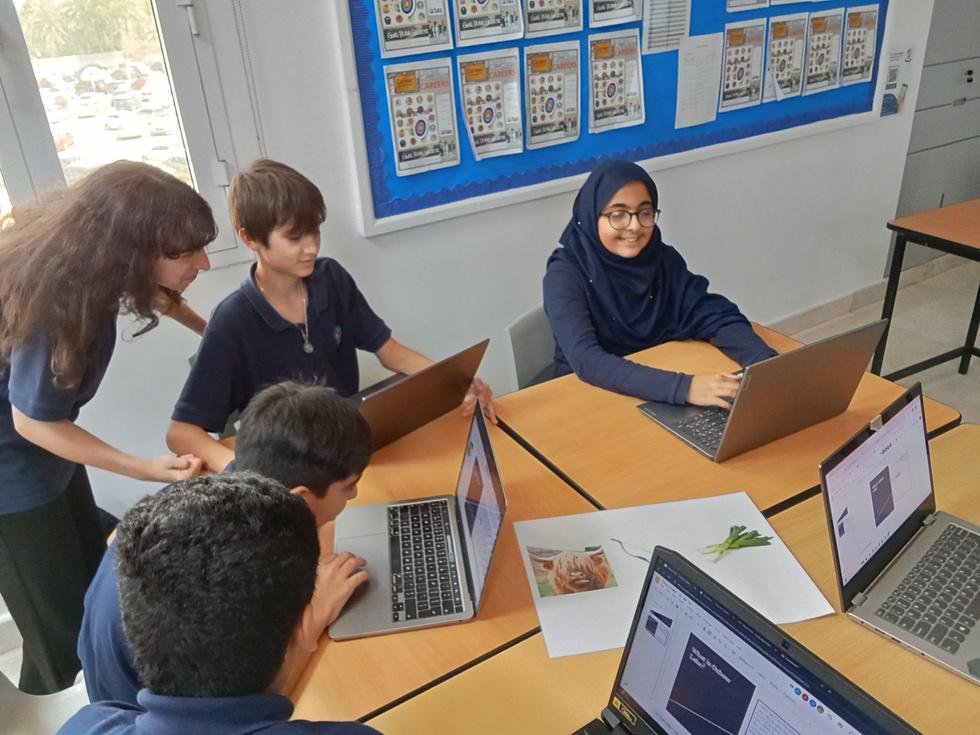
Secondary News
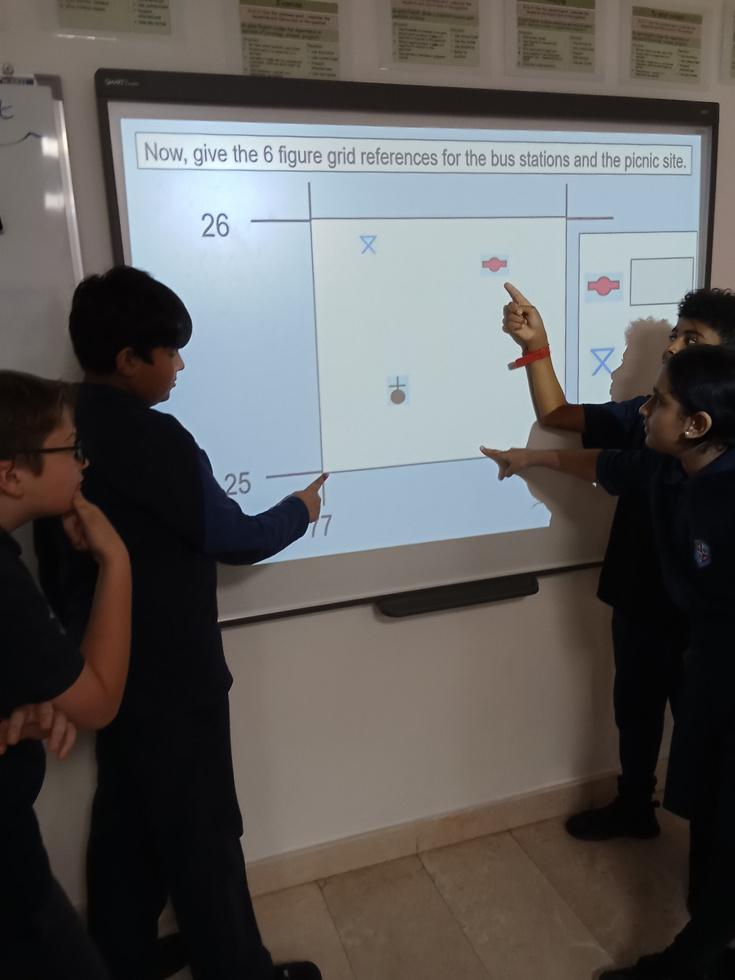
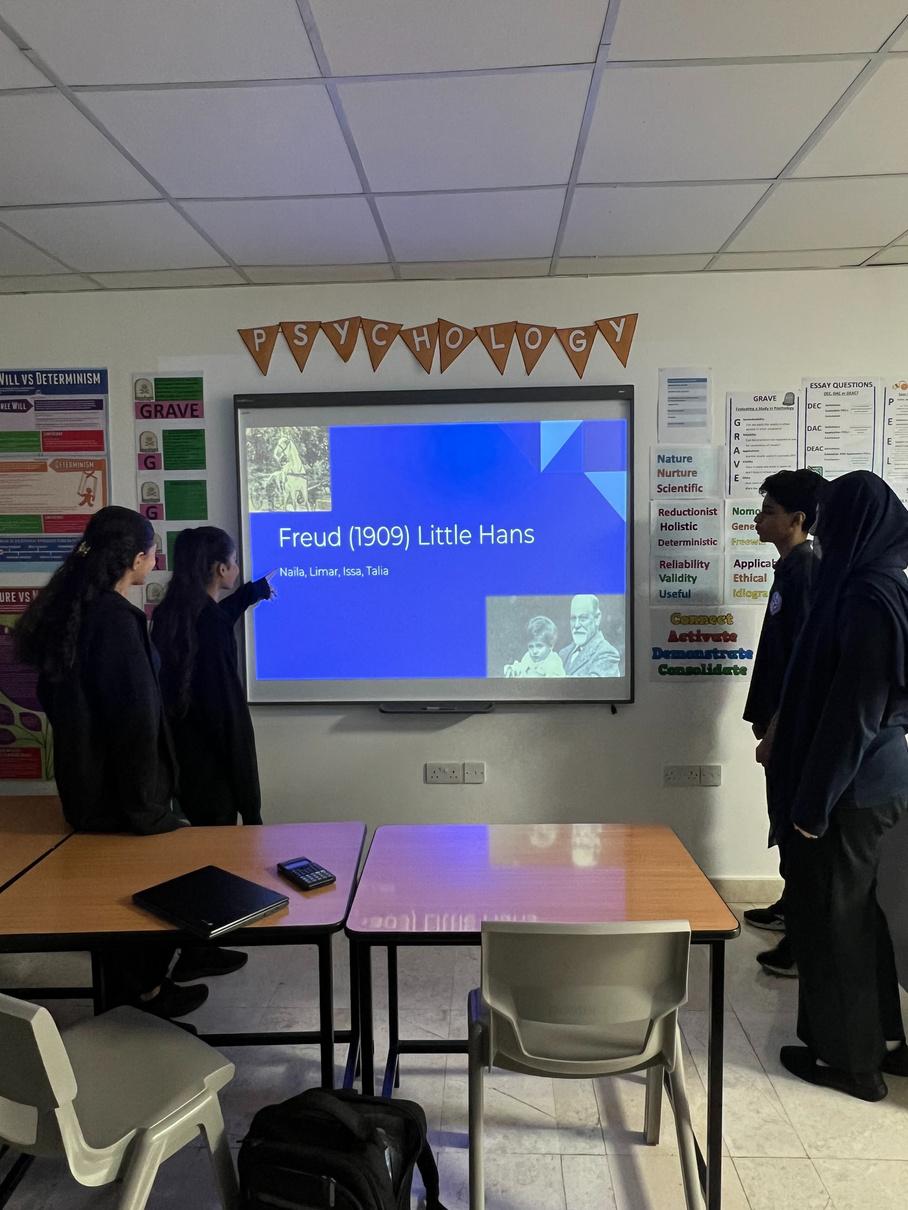
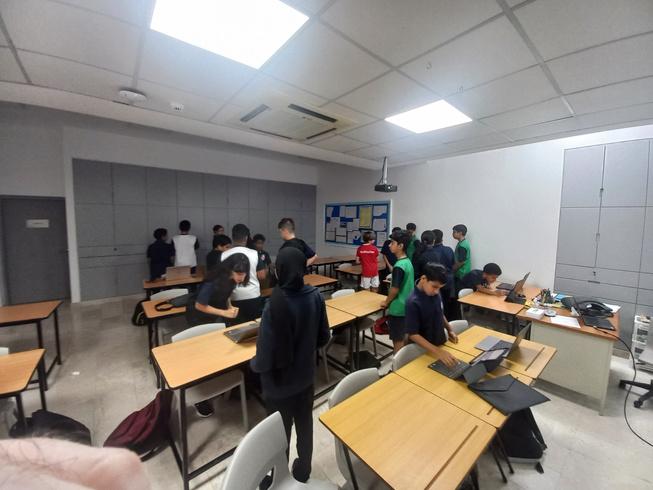
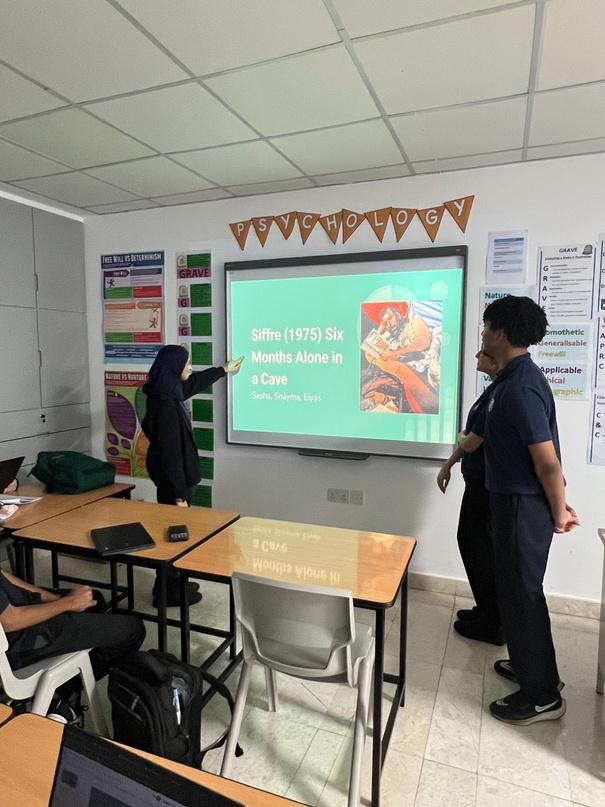
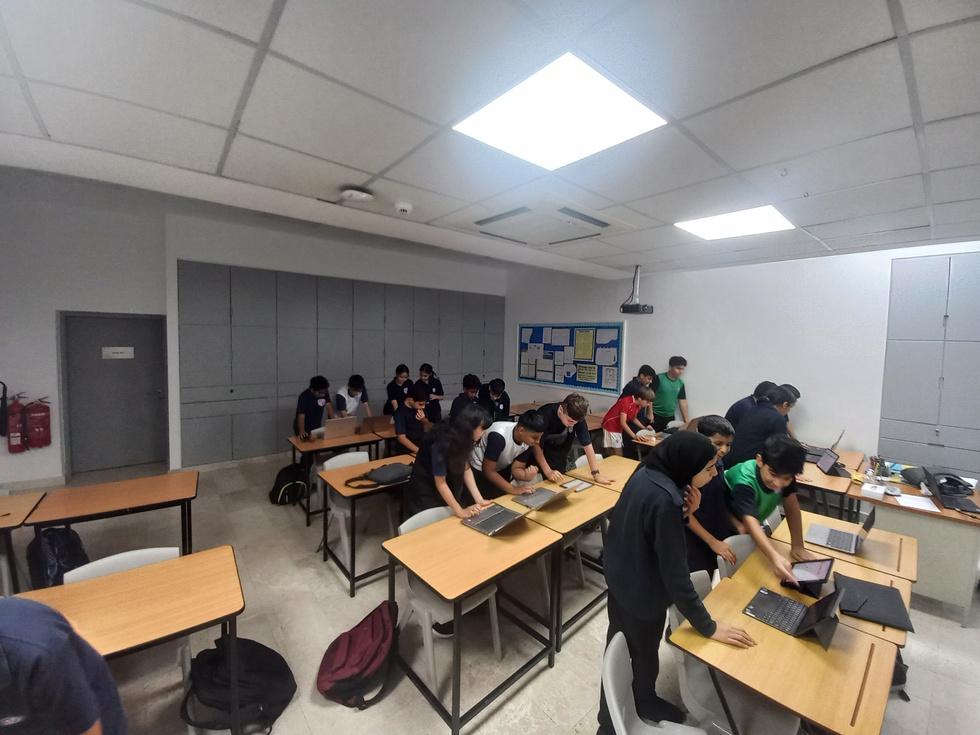

School
We are proud to partner with Azima Catering to offer healthy, nutritious meals for all students. Please contact Ms. Amira at admissions@kgis-edu.com for any queries or requests relating to catering.
Click here to see this week's menu
For General Enquiries please contact the School Reception:
E: reception@kgis-edu.com
T: 2407 3500 / 2407 3501
For academic or pastoral concerns and questions, please contact your child's Homeroom Teacher in the first instance via email
Uniform Shop
The Uniform Shop is situated at the Main Reception and is open Sunday to Thursday from 8:00am-3:30pm
Finance Office
The Finance Office is situated at the Main Reception and is open Sunday to Thursday from 8:00am-3:30pm
E: finance@kgis-edu.com
T: 2407 3517
Admissions
The Admissions Office is open Sunday to Thursday from 8:00am-4:00pm
To see school fees and Admissions information please click here
E: admissions@kgis-edu com
T: 2407 3504
www.kgis.edu.om
